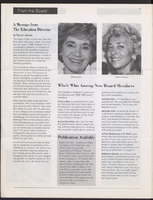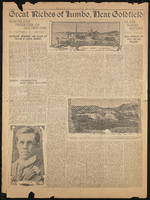Search the Special Collections and Archives Portal
Search Results
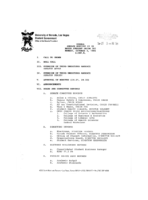
Meeting minutes for Consolidated Student Senate University of Nevada, Las Vegas, October 03, 1994
Date
Archival Collection
Description
Text
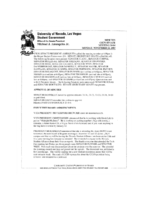
Meeting minutes for Consolidated Student Senate, University of Nevada, Las Vegas, November 24, 2003
Date
Archival Collection
Description
Text

Program for 30th Anniversary Dinner event for the Southern Nevada Chapter of the National Conference of Christians and Jews, 1988
Date
Archival Collection
Description
The program for the 30th anniversary dinner for NCCJ includes dedications and highlights of the Southern Nevada Chapter.
Text

Meeting minutes for Consolidated Student Senate University of Nevada, Las Vegas, September 19, 1985
Date
Archival Collection
Description
Text
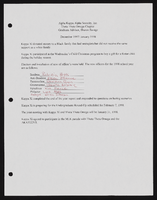
Alpha Kappa Alpha Sorority, Theta Theta Omega Chapter graduate advisor report
Date
Archival Collection
Description
From the Alpha Kappa Alpha Sorority, Incorporated, Theta Theta Omega Chapter Records (MS-01014) -- Chapter records file.
Text

Robert Kim oral history interview: transcript
Date
Archival Collection
Description
Oral history interview with Robert Kim conducted by Kristel Peralta, Cecilia Winchell, Ayrton Yamaguchi, and Vanessa Concepcion on March 05, 2021 for the Reflections: The Las Vegas Asian American and Pacific Islander Oral History Project. In this interview, Kim describes his career in law. He talks about his Korean roots, the model minority myth, and experiencing racial discrimination. Lastly, Kim discusses the Las Vegas Asian American and Pacific Islander (AAPI) community, his involvement with the Asian Bar Association of Las Vegas, and the importance of electing Asian Americans into political positions.
Text

Yvanna Cancela oral history interview: transcript
Date
Archival Collection
Description
Oral history interview with Yvanna Cancela conducted by Monserrath Hernández and Barbara Tabach on February 27, 2020 for the Latinx Voices of Southern Nevada Oral History Project. Yvanna Cancela, Nevada State Senator, discusses her personal history growing up in Miami, Florida and her studies at Northwestern University. She talks of working for Senator Harry Reid's campaign in Las Vegas, which led to her organizing efforts for the Culinary Workers Union Local 226. Yvanna recalls being appointed to the Nevada State Senate in 2016 as the first female state senate majority. In addition to fulfilling her duties as the Co-Majority Whip, she worked on the Joe Biden campaign and is the Executive Director of the Citizenship Project. After this interview was conducted, Yvanna received her Juris Doctorate from the William S. Boyd School of Law at the University of Nevada, Las Vegas. Subjects discussed include: Miami, Florida; Nevada State Senate; The Citizenship Project.
Text

Simon Lamsal oral history interview: transcript
Date
Archival Collection
Description
Oral history interview with Simon Lamsal conducted by Jerwin Tiu, Cecilia Winchell, and Stefani Evans on December 16, 2022 for Reflections: the Las Vegas Asian American and Pacific Islander Oral History Project. In this interview, Lamsal describes growing up in Kathmandu, Nepal, and growing up with his grandparents. After graduating in Nepal, Lamsal applied to college in the United States and started in Arkansas studying computer science but later relocated to Las Vegas, Nevada and continuted at the University of Nevada, Las Vegas (UNLV). Lamsal describes joining CSUN, the National Millenial Community, and investing in his community. Currently, he is in graduate school and an information technology intern at MGM. Thoroughout the interview, Lamsal touches on a number of other topics regarding finding community, cultural foods, and family life.
Text

